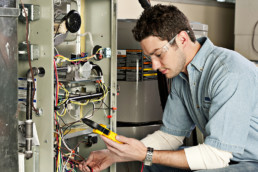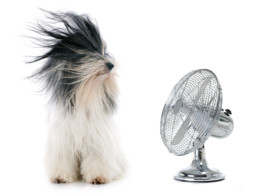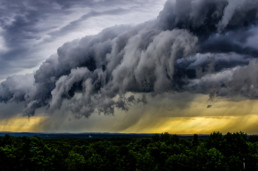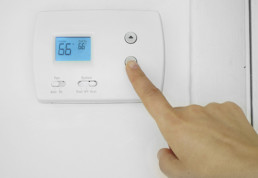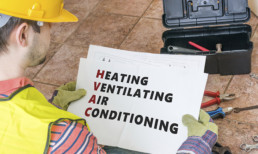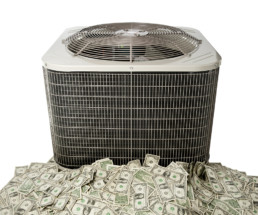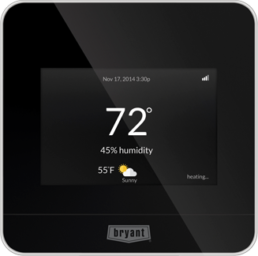Why Should I Have My AC Unit Serviced If It's Not Broken?
Central air conditioners have been a boon to sweltering families during the summer since their introduction in the 1940s. Advances in technology have brought computer controls and more environmentally friendly coolants to central air conditioning systems. The 21st-century central air conditioner is a reliable and powerful product; however, it still needs regular maintenance to remain so.
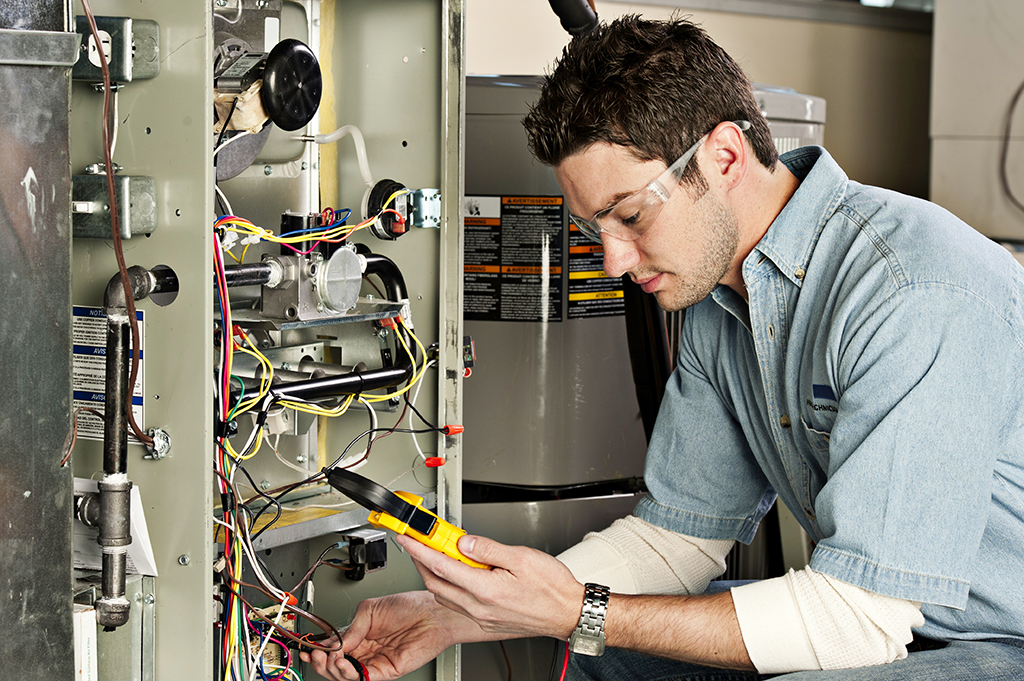 Generally, people will call a repair person if something breaks. If your air-conditioning unit is putting out tepid air when it's 95 degrees outside, you can bet you'll call the repair folks. By periodically having someone in to check your unit over and spending a little bit on preventative maintenance, however, you can save yourself a great deal of money. Federal laws now prohibit the refilling of leaky air conditioners, particularly those that use R22 Freon®, without any of those leaks being repaired.
Generally, people will call a repair person if something breaks. If your air-conditioning unit is putting out tepid air when it's 95 degrees outside, you can bet you'll call the repair folks. By periodically having someone in to check your unit over and spending a little bit on preventative maintenance, however, you can save yourself a great deal of money. Federal laws now prohibit the refilling of leaky air conditioners, particularly those that use R22 Freon®, without any of those leaks being repaired.
Finding leaks is a time-consuming proposition. First, all the Freon® must be pumped out of the system, and the system must be filled with harmless nitrogen. Then, a technician must go along every pipe both inside and outside of the home and check every inch for leaks. Remember, there might also be multiple leaks. Once all the leaks have been found, they must be plugged. Thereafter, the technician must empty the nitrogen from the system and use what's known as a sealant kit to doubly seal the inside of all the pipes. Only then can the Freon® be recharged. Furthermore, if the technician does an examination of both the outside fan assembly and the furnace and determines that the problem is with one of those two units rather than in one of the pipes, the bigger units must be replaced anyway.
Because heating, ventilation, and air-conditioning, or HVAC, is a skilled trade, you can expect to pay the skilled technicians who come to your home or business at a commensurate rate. In most cases, the fee just for showing up will be somewhere between $60 and $100, and the hourly rate is likely to be equal to that or more. If your problem occurs after hours and requires immediate assistance, you can expect to pay double those rates as overtime. In short, if you just leave your air conditioner be until it breaks, you could spend as much as $1,000 for a repair person to do the necessary work or even $2,000 during overtime hours. Even after that, the technician might tell you that you need to replace your equipment.
By contrast, a preventative maintenance check will usually take less than half an hour. The technician will check the Freon® pressure and use a gauge to see if there are any leaks in the line. He or she will also check to make sure the temperature regulator is in good order and that the air temperature that is produced by the unit is within operating parameters. At the furnace, the technician will check to see if the coil is in working order and if it's freezing up for any reason. Such a visit, even at $100 an hour, will cost at most $150 or $200 after figuring in the "showing-up" cost. The best part is that you only have to do such inspections about once a year. As they say, forewarned is forearmed.
Eventually, however, even the hardiest air-conditioning unit will give up the ghost no matter how much maintenance you've done. If this happens to you, your first question is likely to be: "Should I fix it, or should I scrap it and buy another one?" Fixing it is always less expensive, but you have to consider how much it would cost to fix it in the future were it to break down again. There's a simple formula for figuring this out: Take the repair cost and multiply it by the age, in years, of the unit. If the result is greater than $5,000, which is the usual cost of a new unit, get the new unit. For example, let's say your unit is 10 years old. If a repair is $500 or less, do the repair. Otherwise, start shopping around for a new unit.
Why is my air conditioner blowing hot air after running a long time?
There are few things worse than getting your home or office to a comfortable temperature and then having your AC malfunction. But you don't need to have a meltdown; as long as it's blowing air - even if it's warm air - there's hope that it's a minor technical problem that won't require a costly parts or system replacement. Here are some of the most common reasons for an AC unit to start blowing hot, and what you can do to solve the problem.
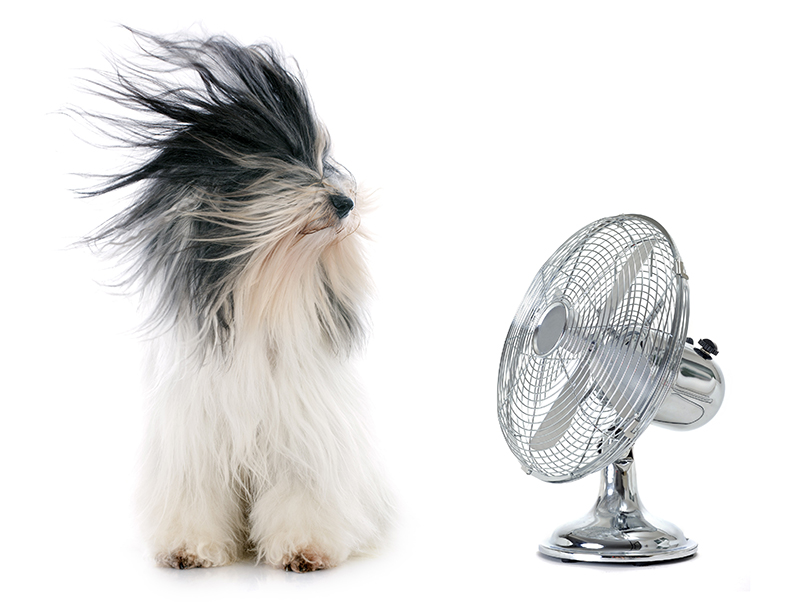
Things You To Check On Your Own
The most common causes for AC problems stem from not having the unit serviced before starting it at the beginning of the warm season, running it full blast, or from simple human error. Regular pre-season servicing will keep your AC running efficiently, and it will allow a technician to spot potential problems before they become costly repairs. Running your air conditioner full blast can cause a range of problems. Not only does it put to much strain on your parts and system, it will cause the whole unit to wear out and need replacement long before it's intended life should be over.
Freezing Up Your Air Conditioner
People run their AC full-tilt for one of two reasons: either the outside temperature is extreme or they turn the unit off when they're not at home and blast it when they return. Both can cause the AC to work too hard and allow the evaporator coil to fall below 32ºF, causing the water droplets that gather inside the unit to freeze on the mechanism instead of evaporating. If ice builds up in your air conditioner it will block the flow of air and prevent cooling. When you keep the temperature set at a consistent level and avoid turning the AC on and off, your unit will run at an even pace and keep a comfortable, steady temperature without over-taxing the system. Experts recommend leaving it set between 76º - 78ºF for warmer climates like Florida while it's in use.
Be Sure The Heat Is Not On Accidentally
Homeowner oversight is also a pretty common issue. Someone may have bumped the thermostat and accidentally set it on warm instead of cool, or you may have forgotten to reset it when winter ended. You can avoid this problem by pre-setting it to a moderate temperature and flipping the switch to auto so it starts when that temperature is reached. Other times the problem is as simple as a clogged air filter or tripped breaker on the outside unit.
Check The Breakers
A breaker just needs to be flipped back on, but if it happens repeatedly, you should have a repair technician take a look to rule out electrical problems. Any system in the home that requires the free circulation of air, whether it's your refrigerator, dryer, or heat pump, needs to have the filter changed regularly. Even if your home or place of business isn't particularly dusty, neglecting the filter will lead to internal systematic freezing and a lot of hot air. Change the filter once a month in the summer and every six weeks in the winter, if it's a combination heating and cooling system.
When It's Time to Call a Technician
If, after checking the temperature, breakers and air filter, your system still isn't running right, the problem may be one of the following:
- a refrigerant leak
- a bad compressor
- faulty wiring, or improper installation, if the unit is new
Unless your system if very old or not well-maintained, all three of these problems are usually caused by overheating due to heavy use. The life of a heat pump or central AC unit is usually between 12 - 15 years; individual parts may last as long as 10 years with regular service and proper usage. If your unit is new, it should still be under warranty from the HVAC company that installed it; parts are guaranteed against defects by the manufacturer for up to two years from purchase. Make sure that you keep your warranty and receipts in a safe place after installing a new AC. Anything not still covered by the manufacturer or installation company needs to be serviced by a professional HVAC technician.
There's no reason you have to suffer from the heat. When your AC starts blowing warm air, check for the simplest solutions first. If checking breakers or changing the air filter doesn't solve the problem, have a professional look at your system as soon as possible. Unless your unit is old or damaged, the problem can usually be taken care of quickly so you can have your space feeling cool and comfortable again in no time.
How does an air conditioner remove humidity?
 During the hot summer months, it's essential you take steps to control the temperature inside your home so that you can enjoy a comfortable and relaxing environment, which can be achieved by using one of the many types of air conditioners. But have you ever noticed how the air temperature always feels warmer when the humidity level is high? This happens because any moisture in the air will retain heat, making the surrounding environment less enjoyable.
During the hot summer months, it's essential you take steps to control the temperature inside your home so that you can enjoy a comfortable and relaxing environment, which can be achieved by using one of the many types of air conditioners. But have you ever noticed how the air temperature always feels warmer when the humidity level is high? This happens because any moisture in the air will retain heat, making the surrounding environment less enjoyable.
Homeowners are often unaware that air conditioners do much more than cool their homes; they also help reduce the level of humidity in the air. But before you learn how an air conditioner can dehumidify the air in your home, you must understand the cooling process.
The Cooling Process
When you turn an air conditioner on, it quickly begins sucking air in and pushing it back out, but at lot happens during that time. Air conditioners contain a chemical refrigerant that can quickly transition from a liquid to gas and back again. When the liquid in the air conditioner starts to evaporate, it absorbs heat from the air around it. Once the air is cooled to a comfortable temperature, it is pushed out through the vent and into your home so that you can enjoy a refreshing environment during the hottest summer days.
The Dehumidification Process
Your air conditioner uses a condenser to change the refrigerant from its vapor form to a liquid. But because your air conditioner takes in air from its environment, the humidity in your home also gets condensed, and dry air is then circulated back into your home as a result. Therefore, if you notice the air in your home seems more humid than usual, then it could be a sign that your air conditioner is starting to malfunction, and you must address this problem promptly before it has enough time to progress.
Final Thoughts
Air conditioners are an essential tool that can control the temperature and humidity inside your home so that you don't have to deal with elevated temperatures. However, air conditioners often give little warning when they are about to break and stop working, but a high level of humidity is one of the first warning signs you will likely notice. If this happens, you must contact a trained air conditioner repair professional as soon as possible. A qualified technician in Venice will take the necessary steps to ensure your air conditioner is working at its best so that you don't need to worry about being without climate control.
Do Heavy Summer Rains Damage My AC?
In areas with high summer temperatures, having air conditioning is essential for staying comfortable. AC is practically a lifesaver in the hotter months, so naturally, people want to take good care of their units. During a heavy rainstorm, many homeowners worry that their air conditioning unit will be damaged.

Luckily, most of the outdoor AC unit's components are designed to resist water damage. All the exposed pieces are made of metal, copper, and aluminum and can avoid damage from heavy rainfall. All the electrical components are safely sealed inside the unit and cannot be affected by rain. Some homeowners still worry, though, and try to protect their unit from the rain by covering it with a tarp. This can actually cause more damage, especially if it remains on the unit for an extended length of time. It can reduce air circulation and lead to the buildup of rust.
Heavy rain most likely will not damage your AC. However, some of the weather conditions that sometimes accompany rain could cause some damage. Storms bring high winds that usually cause tree branches or other objects to fall. Depending on the location of your home and your AC unit, a branch or an object from your yard could fall on the unit and damage it. If possible, clear the area around the AC of any patio furniture, tools, toys, or other objects if you're expecting a storm.
Wind could also cause leaves, dirt, or other debris to get caught inside the unit. You could cover your air conditioning unit for the duration of a severe storm, but remember to remove the covering immediately after the storm dies down. After a storm, especially one with strong winds, inspect the inside and the outside of the unit to make sure it's unharmed.
Severe flooding could also cause damage to your AC. A few inches of water shouldn't be a problem, but if the flooding rises above 15 inches, it could damage the electrical components of the outdoor unit. If your home does experience severe flooding, don't turn your AC on until your HVAC professional checks it out.
Although rain on its own will not damage your AC, other weather conditions can harm the outdoor unit. Stay informed about upcoming severe weather, and inspect your unit for damage immediately after a rainstorm or thunderstorm. If you think your air conditioning unit might be damaged, contact an HVAC professional to take care of the problem.
How Do Air Conditioners Cool Air?
Air conditioners are something that many of us use without even thinking about it. They make life more convenient in many ways. You can keep an entire home or building cool just by turning on your air conditioner. All you have to do is set the thermostat. Your unit will automatically turn on and off when necessary.

However, there is a lot more involved in cooling a home than most people realize. There are also many parts that work together in order to ensure that cool air is delivered to your home. If one of these parts is not working correctly, then the entire air conditioning system may fail.
Air conditioners and refrigerators work in similar ways. However, a refrigerator only cools a small space inside of a refrigerator. The air conditioner cools the entire home, room or business. Air conditioners use chemicals that can easily be converted from gas to liquid. These chemicals are used to transfer heat from the home to the outside.
There are three main parts of an air conditioner, the evaporator, condenser and compressor. You can typically find the compressor and condenser on the outside part of the air conditioner. The evaporator can be found on the inside. It may be a part of the furnace. The furnace is the part that heats your home.
The fluid is delivered to compressor as a low-pressure, cool gas. The fluid will be squeezed by the compressor. The molecules of the fluid are packed together. Packing the molecules closer together raises the temperature and energy.
When the fluid leaves the compressor, it is a high pressure, hot gas. It then flows into the condenser. When you look at the outside part of your air conditioner, you will need to look for the part that has metal fins around that. This part acts as a radiator. It helps the heat dissipate, or go away, completely.
The temperature of the fluid is cooler when the fluid leaves the compressor. It has also changed from a gas to a liquid state. The liquid is delivered to the evaporator in a small hole. The pressure of the liquid also drops. This causes the liquid to evaporate into a gas.
As the fluid changes from a liquid to a gas, it starts to extract the surrounding heat. The heat separates the molecules in the fluid as it changes from a liquid to a gas. The evaporator's metal fins also help with the heat exchange. The fluid is once again a low pressure, coil gas when it leaves the evaporator. It goes to the condenser, and the cycle starts all over again.
A fan is connected to an evaporator. This fan blows across the evaporator fins and circulates air throughout the entire house. The hot air is not as heavy as the cold air. That is why hot air rises to the top of a room.
There is a vent located where the air goes into the air conditioner and ducts. The hot air helps cool the gas inside of the evaporator. Air is cooled as the heat starts to get removed from the air. The air is distributed throughout the house via the ducts. These ducts are typically located at the floor level.
This cycle will repeatedly continue until the desired temperature is reached in the room that one wants to cool. When the thermostat senses that the room has reached the optimal temperature, the air conditioner will shut off. The air conditioner will turn back on when the temperature inside of the room starts to increase. It will remain on until the room reaches the optimal temperature.
What Should I Look For In A HVAC Company?
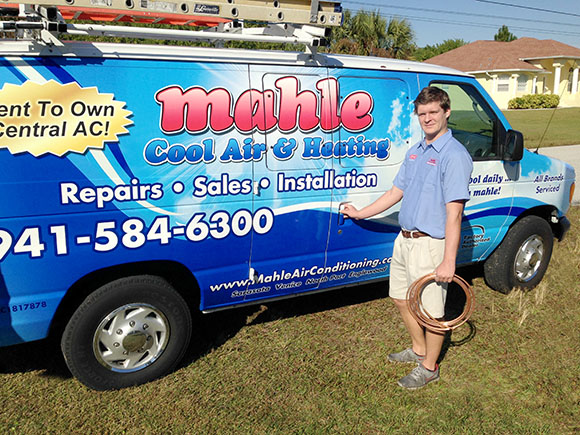
It can be very difficult to find a good HVAC company. Many people find themselves looking through countless ads in the yellow pages or online and are still unable to find what they are looking for. Fortunately, knowing exactly what to look for in a HVAC company will make the decision a lot easier. Below is a list of things you should look for in a HVAC company:
Good Reputation
You should choose a HVAC company that has a good reputation. One of the ways that you can find out about a HVAC company's reputation is by checking out the Better Business Bureau website. The Better Business Bureau is an organization that gives businesses ratings on a scale from A+ to F.
Licensed
You should select a HVAC company that is licensed. HVAC companies must meet the minimal training requirements before they are given a license. They must also pass a written examination.
Liability Insurance
All HVAC companies should have liability insurance. The purpose of liability insurance is to protect the customer if the contractor happens to get injured while they are at your home. Because the purpose of liability insurance is to protect you, you definitely want to choose a company that has it.
Properly Certified
The HVAC company you choose should be certified by the North American Technical Excellence organization. This is an independent organization that certifies companies in the HVAC industry. If a company has been certified by this organization, then you will be able to rest assured that it meets the necessary qualifications.
Referrals
Before you hire a HVAC company, you should ask for their references. They should be able to provide you with at least three. Ask questions about the type of service that you received from the company. You should also ask them if they would use the company again.
The Cost
Any type of HVAC service can be costly. That is why the cost is something you should ask about before you select a HVAC company. However, you should not choose a company just because it offers a lower cost. Many companies that are not licensed or insured offer low-cost services.
Surveys Your Home Before Giving You A Cost
In order to give you an accurate cost on your service, an HVAC technician will need to survey your home. This includes things such as checking your air ducts for leaks. You should not select a company that will give you an estimation over the phone without coming to your home first. Some companies will give you one cost and then jack up the cost after they come to your home.
Does Not Discourage You From Buying Higher-Efficiency Equipment
Contractors should stay up-to-date with the latest HVAC equipment. If a contractor tells you not to buy higher-efficiency equipment, then they probably do not know how to install it. A good HVAC company will be able to tell you about the latest HVAC equipment and how much money you can save with it.
Belongs To A Professional HVAC Organization
If a company belongs to a professional organization, then they most likely do quality work. Air Conditioning Contractors Of America is an example of a professional organization. You can find out whether a HVAC company is a member of that organization by visiting the website.
Sells High-Quality Products
The quality of the product is one of the factors that determines how long it will last. You should make sure that your contractor sells Energy Star products. Those products not only last a long time, but they can also help you save money on your energy bill.
How to Get Your Air Conditioner Ready for Summer Heat
One of the most significant factors that will impact your home's energy costs throughout the summer months is your cooling system. When an air conditioner has been properly maintained, it can operate with peak efficiency, and this can result in a drastic reduction in cooling costs as well as the decreased likelihood that you will have to endure downtime and repair bills throughout the summer season. There are a few steps that you can take now that will help you to better maintain your home's air conditioner. By implementing these tips today, you may enjoy lower energy bills with improved efficiency throughout the summer season and beyond.

Change the Air Filters on a Regular Basis
If your system uses disposable air filters, it is important that you change these out at least once a month. Dirty air filters will block the flow of air as it passes from your HVAC unit, and this can cause the system to work harder to force the air through the filter than it otherwise would need to. It also can lead to a reduced life span for your system and increased repair bills over time. Ideally, the filter will be replaced before you see visible signs of dirt on it. If you have a filter that is reusable, be sure to wash it according to the manufacturer's recommendations on a regular basis.
Clean the Outdoor Unit
Air conditioners have both indoor and outdoor units, and outdoor units, which are also known as condensers, can easily get dirty with regular exposure to the elements. Take a moment to inspect your condenser unit on a regular basis to look for signs of plant growth creeping up around and into the unit. Also, look for grass clippings and other elements that may eventually work their way into the system and cause inefficiency in its operation. If you choose to clean the HVAC unit on your own, always turn off the thermostat before working on the condenser to prevent damage to the unit and injury to yourself.
Schedule Duct Cleaning Service
The air ducts are responsible for carrying climate controlled air through your walls and ceilings to bring cool air to the rooms of your home. They can easily accumulate matter that ranges from dust and pet dander to bacteria, mold spores and more. When these become clogged, the airflow cannot pass efficiently through the ducts, and this creates inefficiency with the HVAC unit itself. Generally, a professional will need to clean the ducts for you, and this should be done every year or two for the best results. The professional can also determine if you have leaks in your air ducts, which also may cause inefficiency and unnecessary energy loss, and he or she can repair the leaks for you.
Replace Fan Belts When Needed
Fan belts are located on the condense unit on the exterior of the home, and they often require cleaning, maintenance, adjustment or a full replacement. This is a simple enough project for some homeowners to tackle on their own, but others may feel more comfortable if a licensed HVAC technician completes the work for them.
Schedule Annual Maintenance for Your System
Like other mechanical equipment, such as your car, an HVAC unit requires annual maintenance service for longevity and efficiency. A licensed and insured technician can easily provide annual maintenance for your system that will include cleaning the components, inspecting it for signs of damage and tuning it up where necessary. This is a great way to promote peak efficiency and to reduce repair issues over the summer season.
How to Maintain Your System
As you can see, some of these steps should be taken monthly, such as changing air filters, and others should be taken annually. Others may simply require you to be vigilant and to observe the system periodically. At the start of the summer season, it is wise to go through each of these steps, or to ask a technician to assist you with the ones that you are not comfortable doing on your own. For repeated processes, such as changing air filters, mark your calendar so that you remember to complete these important steps on a regular basis.
Keeping your HVAC unit well-maintained is important if you want to enjoy peak efficiency with lower energy costs and fewer repair bills. These steps can also help you to enjoy improved longevity so that you get the most life out of your system. Now is a great time to begin working on these steps and improving your HVAC system.
New Air Conditioners - Better For your Wallet, Better For The Environment
Most of us live where some kind of home cooling is necessary, places where temperatures, air quality and humidity make central air conditioning a necessity for health and comfort. However, as with anything, there are costs and impacts to be considered. Energy is expensive, and prices continue to rise. Most of us are also concerned about the impact our energy choices have on the climate. How can we minimize the impact of this necessity on our wallets and our planet?
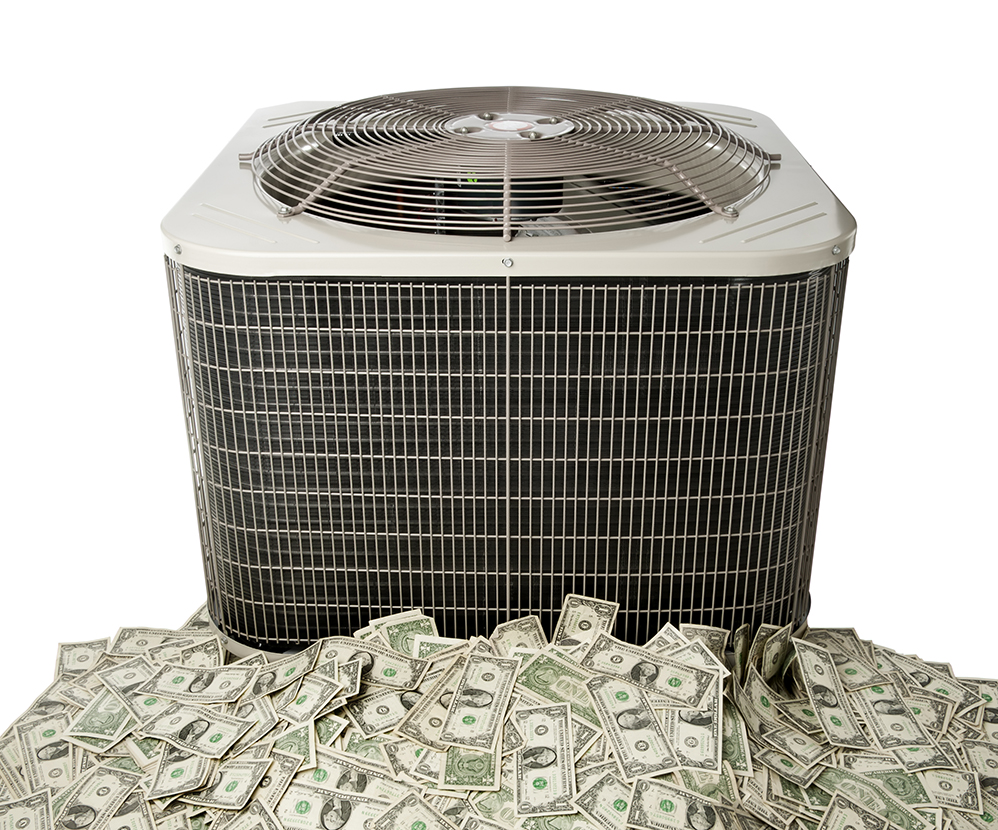
The average homeowner spends about $875 a year on heating and cooling energy costs. This can account for nearly half of all household energy expended throughout the year, and accounts for the majority of energy used during summer months. Naturally, this can be quite a financial burden for the average family. Replacing your present outdated air conditioning unit with a more efficient current model could cut your cooling costs by nearly 30%, making a big difference in the household budget.
Looking beyond the household expense alone, the impact on our environment may be even costlier. In just the United States alone, household cooling generates around 100 million tons of CO2. If every home with air conditioning chose to upgrade their current system to the most efficient air conditioning system available today, CO2 emissions would decrease by nearly 40 million tons. That's a 40% reduction, which is huge. Reducing energy usage protects our planet by reducing harmful carbon emissions and lowering other greenhouse gases. There is clearly great potential for improving the planet's health through energy efficient cooling units alone.
So how can you decide whether your current air conditioning unit needs replacing? If your system is more than ten years old, or it cycles on and off in rapid succession while in use, you should definitely look into upgrading your air conditioner to a newer, more energy-efficient model. Energy usage standards are constantly improving, meaning today's units are far more efficient than those of even five years ago. This is good news for homeowners, since selecting a cost-effective air conditioner is now easier than ever. It would not be unreasonable to expect a 20% reduction in energy consumption from your cooling system when upgrading.
Central air conditioning requires a blower motor, which is usually a part of the home's heating system, in order to move cooled air through the duct work. The best way to guarantee that your newly installed, energy-efficient air conditioner performs at peak efficiency is to install a new furnace at the same time. This is particularly important if your furnace is older than 15 years, as the blowers on older models do not operate as efficiently as current ones do.
Proper maintenance is essential if you hope to achieve the energy rating promised by your new system's literature. To prevent potential problems with your air conditioner from arising, it's a good idea to schedule regular maintenance of your unit with an HVAC technician. They will do a complete tune up of your system, including cleaning and inspection. An annual inspection and tune up before the cooling season begins is best. One tip for remembering to schedule this regular maintenance is to call for a check up when you change the clocks in the spring. One vital maintenance task you can perform yourself is to regularly clean the air conditioner's filter. A dirty filter is a major cause of air conditioning breakdown, and will prevent your system from operating at peak efficiency.
Probably the biggest improvement you could make to your home's overall energy efficiency would be to upgrade the residential air conditioning system to an improved, more energy efficient model. Energy prices continue to rise and show no signs of slowing down. The careful selection of an up to date, energy efficient residential air conditioning system will provide big savings in your home energy budget as well as making the planet a healthier and happier place.
New Programmable Thermostats Offer Larger Energy Savings
Regardless of the temperatures outside, your household can be comfortable year-round when the thermostat is properly set. As technology continues to improve, HVAC systems respond with digital control panels and advanced temperature sensors. Currently, you can use your AC thermostat to save money when you know how to program it. Take a look at the clever strategies possible today, and you'll see your electrical bill dramatically drop.
Cold, Weekday Settings
When winter's chill sets in, you might automatically turn the heater up. However, your home doesn't have to be warm and toasty when everyone is at school or work. To save money during the winter weekdays, set the thermostat to 56 degrees Fahrenheit. The home has some warmth to it in order to keep everything from freezing without conditioned air circulating inside. When everyone returns home, the thermostat can be set at a higher temperature. This low, 56-degree F. temperature can save a family hundreds of dollars throughout the year because most households are empty for about eight hours each weekday. That's a long time period for money savings with the right thermostat setting.
A Full Household on Cold Nights
 Dinnertime and the early evening hours should be warm in your home, so turn the thermostat to 68 degrees F. during this time. The temperature change is a small one so that the HVAC system doesn't work too hard to warm the space back up. If anyone is chilly, they can always wear a sweater or cuddle under a blanket as they watch television. As everyone goes to sleep, the thermostat should be turned down to the upper 50s again. There's no need to keep the home really warm when everyone is in bed and under thick blankets.
Dinnertime and the early evening hours should be warm in your home, so turn the thermostat to 68 degrees F. during this time. The temperature change is a small one so that the HVAC system doesn't work too hard to warm the space back up. If anyone is chilly, they can always wear a sweater or cuddle under a blanket as they watch television. As everyone goes to sleep, the thermostat should be turned down to the upper 50s again. There's no need to keep the home really warm when everyone is in bed and under thick blankets.
Summertime Programming
Ideally, you should use the same thermostat strategy during the summer. When everyone is at home and the exterior temperatures are rising, the thermostat should be set to 78 degrees F. This temperature may seem high, but you can counteract any discomfort with ceiling and desk fans. Fans will always used less energy than the HVAC system and save you money. As everyone leaves for the day, set the thermostat for the mid-80s. The home won't be too warm when everyone returns. The HVAC system doesn't work as hard to cool the home with no one inside, and money savings are the result.
Learning Thermostats
If you have an AC thermostat that's 10 years or older, consider a small investment in a learning model. Many thermostat models today have microprocessors that actually "learn" about your favorite temperature settings. If you diligently lower the temperature around 8 a.m. each weekday as you leave for work, the system notes this in their programming. One morning, however, you may forget to set the thermostat. In response, the system automatically sets itself for your favorite temperature. This helpful response can save you a lot of money over time. At some point, you may rarely set the system because it's learned all of your preferred settings.
Remote-Access Systems
If you want more control over your energy use, look for remote-access systems. Your AC thermostat can have WiFi connectivity. When you're at work or school, you can log into your account through an Internet connection. Turn the thermostat up or down whenever the weather changes drastically outside. Controlling your system from any location allows you to save on energy costs. You don't have to worry if you forgot to turn off the AC, and arrive home to either frigid or hot conditions. Simply log in and access the system's current power level. With the swipe of a finger, you're always in control.
Calling your trusted HVAC company on a regular basis can help you save money too. These technicians can explain the latest programming options and service the system simultaneously. A well-maintained system combined with the right programming will increase the AC components' lifespans and keep you comfortable every day of the year.
What Kinds Of Coolant Are Used In Air Conditioners?
A variety of different types of coolants are used in newer models of commercial air conditioning systems. It’s important to understand coolants, to be able to make informed decisions regarding maintenance, repair, and updating of HVAC system. Three of the most popular refrigerants currently in use are R-407C, R-410A, and R-134a, but there are others in use as well. The various types of coolants and their main properties are described below, including the older R-22 that must be replaced with newer coolants.

R-410A
• This coolant has been approved for use in new HVAC systems.
• It is common to identify R-410A by a brand name rather than its generic description. It may be called Suva® 9100, Genetron® AZ-20®, Puron®, or another brand name.
• Since it is a hydro-fluorocarbon (HFC), it does not cause ozone depletion.
• It is the most commonly-used refrigerant for newer, light-commercial and home unitary air conditioning systems.
• The operating pressures for R-410A are significantly higher than R-22, requiring that R-410A systems have components that can work at pressures over 50% higher than R-22 systems.
R-22
• R-22 is no longer used for new air conditioning systems, a change that became effective in 2010.
• A common brand name for R-22 is Freon®.
• This coolant is a hydro-chlorofluorocarbon (HCFC), a type of coolant that is no longer used because it causes ozone depletion.
• Use of this coolant is prohibited in all HVAC units after 2015.
R-134a
• This coolant is used in many different refrigeration and air conditioning systems around the world.
• Because it is a hydro-fluorocarbon (HFC), it doesn’t cause ozone depletion, as older coolants did.
• It is the first non-ozone-depleting fluorocarbon coolant to have been successfully commercialized.
• This coolant has a single component and no glide, and is used in many big commercial screw chillers.
R-407C
• This coolant goes by the brand names Genetron® 407C and Suva® 407C, among others.
• R-407C is a hydro-fluorocarbon (HFC), and is preferred because this type of compound doesn’t lead to atmospheric ozone depletion.
• R-407C is the closest match to R-22 of all the higher-temperature hydro-fluorocarbon coolant options.
• This is a high-glide coolant and has lower efficiency than others, but because it has similar pressures to R-22 it provides the simplest conversion.
A Great Option
R-410A is a good choice as a long-term coolant option for both light commercial and residential air conditioning systems. The reason for this is that it combines highly efficient performance with a direct GWP value that is close to the value of R-22. It is also energy efficient and easy to use in most air conditioning systems, plus many components are now available that contribute to the ease of designing R-410A systems that operate efficiently.
R-410A is often the coolant of choice for new system designs because it absorbs and releases a greater amount of heat than R-22, allowing the A/C compressor to run cooler, and thus decreasing the risk of the compressor burning out from overheating. Because R-410A operates at higher pressures than R-22, use of this coolant also requires that compressors be built to withstand these increased pressures. The result is that the system is better made and less likely to crack.
R-410A air conditioning systems use Polyol Ester oil (POE) for lubrication, an oil that dissolves better than the mineral oil that had been previously used did. This means that the newer cooling systems operate better, thus minimizing the amount of compressor wear and tear and allowing the equipment to last longer.
A final consideration regarding any air conditioning system is how environmentally friendly it is. In some areas, it’s possible to get tax incentives or rebates for systems and buildings that meet state or local utility green codes. Systems that use R-410A are more sustainable and easier on the environment. As such, these systems can have a rapid payback period and may earn rebates as well, making them an economically sound choice as well as a positive choice for the environment, and this difference can make these systems the first choice for new installations.
